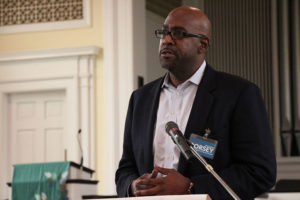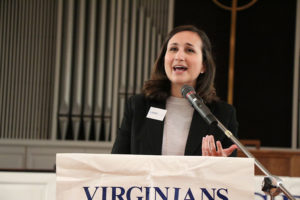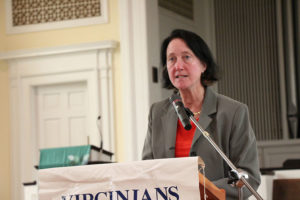 Affordable housing continues to divide the candidates for County Board, with the two Democratic nominees supporting the Affordable Housing Master Plan and the two independents proposing alternative methods at a debate over the weekend.
Affordable housing continues to divide the candidates for County Board, with the two Democratic nominees supporting the Affordable Housing Master Plan and the two independents proposing alternative methods at a debate over the weekend.
The County Board candidates all announced varying degrees of support for increasing affordable housing in Arlington, but disagreed on the best way to implement it during a candidate forum held by Virginians Organized for Interfaith Community Engagement Sunday evening.
“Everyone’s in favor of everything, and that’s the balancing act in this community,” said independent candidate Mike McMenamin.
The county needs to focus on geographic distribution of affordable housing units, said McMenamin, who has previously said affordable housing is not one of his priorities. The county should also go back and address its 2003 targets for the amount of affordable units, which it only met twice, he added.
McMenamin, who does not support the Affordable Housing Master Plan passed by the County Board last month, said that the County Board needs to look at how to add affordable housing and address school capacity, without sacrificing parkland for more affordable housing units or more schools. Finding the money to support all of these plans is also a challenge, he added.
One of the high costs to the affordable housing plan is the choice to increase the amount of committed affordable units (CAFs) instead of trying to incentivize market-rate affordable units (MARKs), said Audrey Clement, the other independent candidate.
“There is a serious question of whether CAFs are the way to go,” Clement said.
The new Affordable Housing plan calls for 15,800 affordable housing units, and making them all CAFs would be too expensive for the county, she said, arguing that MARKs are cheaper.
“Private developers can build units much more cheaply than the county can, so limit new construction to onsite units in market-rate developments,” she said.
Clement has spoken out against the Affordable Housing Master Plan, and if elected, plans on creating a housing authority to oversee all housing concerns in Arlington, similar to the authorities in Fairfax County and Alexandria.
Both Democratic nominees, Katie Cristol and Christian Dorsey, reaffirmed their support in the affordable housing plan.
Beyond affordable housing, candidates all addressed community concerns about the disconnect between Arlington residents and the Board. The “Arlington Way,” the county’s system of community involvement in decision-making, needs some retuning, candidates said.
 It is on the community’s shoulder to tell County Board members what the problems are in the county, Dorsey said.
It is on the community’s shoulder to tell County Board members what the problems are in the county, Dorsey said.
“It’s not what I am going to do. It’s what you all are going to do, and everybody else in Arlington. You all are going to tell us what is necessary to make sure every voice counts,” he said. “It does not work if elected officials tell you what they are going to do to listen. You have to tell us what we need to do to make sure your voices are heard.”
It’s also about going to meet the community where they are, Dorsey and Cristol said.
“We have to get rid of this excuse that they don’t come to our meetings,” Cristol said.
Increasing community engagement means making meetings at times that are reasonable to community members and personally inviting leaders to come to meetings, she said.
It’s also important that the public is brought into the process at the beginning, not the tail end, said McMenamin, citing the recent discussions about Fire Station 8.
If elected, he plans on going to community meetings, talking to people at farmer’s markets and even knocking on people’s doors to get their opinions about bigger decisions, he said.
“You have to listen to the neighborhoods and do what’s right,” he said.
 In addition to fixing the “Arlington Way,” all candidates pledged to focus on the school capacity crisis and the commercial vacancy rate issues that are plaguing the county.
In addition to fixing the “Arlington Way,” all candidates pledged to focus on the school capacity crisis and the commercial vacancy rate issues that are plaguing the county.
Addressing the school capacity rate needs to be figured out by both the Arlington School Board and the County Board, Cristol said, adding the community has to be involved from the beginning.
“To me, this issue is one of how do we manage our growth,” she said.
There is no doubt about the need for new schools, Dorsey and McMenamin said.
“What we really need to do is build another elementary school in South Arlington,” Dorsey said. “For me, the numbers suggest that.”
The South Arlington school should be built vertically, to reduce the amount of land required, McMenamin said. He added that there may be some creative solutions possible, like using vacant office space to temporarily house a school. Cristol suggested that more schools use underground parking lots to save surface space.
The office vacancy rate is a big problem because the commercial sector makes up half of the tax base in Arlington, McMenamin said.
The County Board should turn to landlords and ask for their ideas, McMenamin said. Arlington also has to become more friendly to businesses, especially in terms of permitting, which is too long of a process in the county, he added.
Dorsey said that using vacant buildings for temporary uses will make streets more lively and more attractive to businesses.
“It’ll work in a place like Crystal City where you can envision space for artists,” he said. “We should be encouraging more temporary uses so we can activate these streets where there’s nothing going on.”


